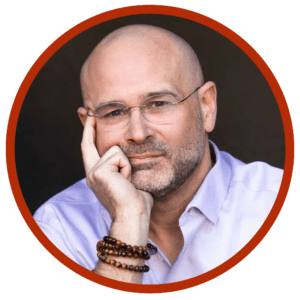As you wake up tomorrow morning, take a look around and notice the people you encounter daily. You’re likely to see that many of them are tired, worried, frustrated, or just sullen. They might be thinking about their work or struggling with money or maybe they just don’t feel good enough. It’s so easy to allow ourselves to spend our days in this way- minds on something else or somewhere else- simply going through the motions of life. But let me ask you something: is this kind of life what you want? Does it have meaning for you?
I know how it feels, guys. Sometimes we get so caught up in the daily grind of work and life – in our projects and in our tasks and in our worries and in our stresses and in our burdens – that we feel like a moment of peace is impossible. We’re all trying to juggle too much when it might be time to let go.

KEY POINTS
- Many of us may meditate every so often or even may have a meditation routine.
- Now it’s time we take that mindfulness beyond just our meditation time.
What is life if it’s not vibrant and joyful?
What’s the point in living a life that doesn’t make you feel like you’re alive? What is life if it’s not beautiful and wonderful? It’s worth going through all the hardships and miseries, so long as you feel vibrant on the inside.
That’s where mindfulness and meditation become very important in our lives. These are the tools where we can use to travel to the center of our being. And all the miseries, the turmoil, the stress. We can have the proper relationship with that and put that on the periphery. In the center, this is where pure silence and true bliss reside.
Many of us may meditate every so often or even may have a meditation routine. Now it’s time we take that mindfulness beyond just our meditation time.

What does it mean to meditate and practice mindfulness?
“Peace comes from within. Do not seek it without.” ~ BUDDHA
There are many different forms of meditation. Additionally, there are even more definitions for what exactly meditation is. Just sitting down for 20 minutes with our back straight eyes closed, by itself, isn’t meditation. We might have only mastered the art of napping in a vertical position.
As guru and mystic OSHO said, “Meditation isn’t something we can do; it’s something we can become.” So does this mean our meditation routines don’t have any significance? No, not at all. Think of meditation as the blossoming of a flower. For a flower to blossom, you’ve got to prepare the soil and give the right fertilizer and nurture it properly.
That’s the job of meditation—the preparation of the soil. Once the flower of meditation blossoms, all of our stresses, our miseries, all of those worries begin to wither. We can put these in a proper perspective and not have them run or control our thoughts, our emotions and lives. We can begin to experience life like never before.
Meditation is like physical exercise. The better you prepare, the better you perform.
One of the main aspects-the one thing-of becoming meditative is mindfulness, which is to observe our thoughts and emotions without judgment. Without labeling them as “positive” or “negative.” Just observing them as they come and go. And, as a result, we can become aware of these patterns rather than being lost in them.
Why should you take mindfulness beyond meditation?
“If there is no meditation, then you are like a blind man, in a world of great beauty, light, and color.” ~ J. Krishnamurti
Remember when we talked about the fact that we can’t do meditation and that instead, it’s something we become? We become meditative. By becoming mindful throughout the day, we take these further steps towards becoming meditative.
One of the biggest reasons for our suffering, our uncomfortableness, is the identification we have with our thoughts or emotions and the labels we put on them.
For example, suppose someone said something very hurtful to you. And now the thought of that can keep appearing in your mind. And, without your knowledge, that thought keeps hurting you because you’re continuing to react to it with unawareness.
By being mindful, you’re able to observe those thoughts and those emotions without indulging in them or even reacting to them. When we’re aware, the thoughts still appear. You still have your emotions. They have a purpose that they serve. They just won’t be able to create those adverse feelings in you.
They won’t be able to control your emotions. You can put them in their proper perspective. And the way you react to situations and how you respond to situations will also improve because your actions are coming out of awareness. And this significantly helps to improve our relationships with other people and, most notably, with ourselves.
As a guy, you need to be mindful of how you’re feeling because if your feelings are getting the best of you, then they’re going to ruin your day. They’re going to turn that one tiny incident into a big deal that’ll snowball into something much worse. This is why it’s so important that you stay in control and pay attention to what’s happening inside. Don’t let your emotions choke you.
You’ll find daily life becoming more effortless, more at ease. You’ll have more of a sense of peace because everything has its proper perspective. These external situations won’t affect you as much because of your healthy relationship with them and in the right place. You begin to attain that true peace of mind.
Get the free guide Quiet Confidence: A Men’s Guide to Living a Free, Authentic, Joyful, Centered, & Purposeful Life”
This workbook will provide you with an introduction to mindfulness as a foundation for living a more deliberate, authentic, purposeful life of peace, freedom, health, and fulfillment.
You’ll also signup for the newsletter to get valuable content right in your inbox.
Your privacy is respected. Data will never be sold or shared. Unsubscribe at any time.
So, how do you take mindfulness beyond meditation?
It’s very simple. And it’s not easy. Whatever you do, just become a pure witness to what you’re doing, without any judgment. Have you ever noticed that you can eat so fast while thinking about something else that you don’t even remember what you ate? Or you might be driving home, and you don’t even realize when you suddenly get there? That’s the outcome of unawareness. Our minds are distracted. We’re thinking about other things instead of what’s right in front of us at that particular time. These are the things you’ll find changing when you become more mindful.
When we’re not present, we’re pretty much suffering. We might be suffering from a lack of awareness and we’re living our lives as this mindless zombie. We might be suffering from the sense that too much is happening and we’re unable to keep up with it all – or maybe we can’t seem to enjoy anything or focus on anything for very long. Or maybe even suffering from the sense that nothing is happening and nothing will ever happen.
We tend to not feel alive when we’re disconnected from our lives and mindsets, so the first step towards healing is becoming more present in your life. This means checking in with yourself throughout the day and discovering what you want to do, what you like doing, who you like talking to etc.
Mindfulness is about acceptance – it’s not about forcing yourself to do anything. It’s not about denying yourself what you want; neither is it about blindly following your desires. It’s about acknowledging your emotions and accepting the things that are going on right in front of you – even if they might be unpleasantly different from what you had hoped for. It’s about ignoring your emotions and desires just as much as it is about giving into them.
And this holds true for pretty much all aspects of life: whatever you’re doing, just become a pure witness to what you’re doing without any judgment. When we watch ourselves in action, whether it’s something we do out of habit or something we never considered doing before, we gradually become aware of what kind of person we are. We begin realizing things about our behavior and tendencies – for example, you might realize that you eat super fast when you’re preoccupied with your thoughts/emotions/memories etc., or that you’re a pretty impatient person, or that you’re always late to every event. This might not be super pleasant at first, but it’s important to understand yourself better if you want to get along with the people around you and take care of your needs in an optimum way.
So basically – mindfulness is about being aware of what goes on in your life and accepting it.
Acts done with awareness are the best possible actions you can do. So here are some things that you can do to go beyond meditation and become meditative.
Go for a walk. And while you walk, try to focus on what you’re doing. Focus on your surroundings. What temperature? How does that air feel on your skin? How do your feet feel? Feel each point of contact with the pavement as you walk and just focus on walking.
Make many of your daily tasks, mindful tasks. Do only that, don’t try to multitask but instead focus singly on that one thing that you’re doing. Suppose you’re having your morning coffee. Smell the coffee, taste the coffee. Feel the temperature as it touches your lips and your tongue. Drink the coffee and not the projects and tasks you have to do once you finish the coffee.
Throughout your day, focus on single-tasking, do one thing at a time and give that your full attention. Don’t try to multitask because if you’re trying to do more than one thing at a time, you’re not doing any of them.
Work on having a better relationship with your mobile device; don’t check it every few minutes. Put it away, maybe even turn off your notifications during specific periods. That way, you can do those things undisturbed, and the thought does not tempt you about what is that new email that came in or what just happened on Instagram or Twitter.
Know when not to check your phone. Take breaks just to be mindful of your breathing. Feel your breath coming in and out. Try to slow it down. Get it deeper and deeper into your diaphragm. Feel the air coming inside and helping to. Relax your entire body. Just again, paying attention.
What does being mindful actually mean?
Being mindful isn’t all about having happy thoughts all the time. Or being in some state of bliss, it’s about accepting what the moment is.
If you feel stress, then focus on that. Why do you feel stressed? What can you do about it? What can you do to change your relationship to it and thereby change how you’re feeling?
Don’t try to avoid negative feelings. Or force positive emotions. Just accept them as they come and be aware of them. These different feelings are going to coexist. And being able to do that without them controlling your reactions helps us become mindful, helps us become meditative. Watch the thoughts passing in your mind without any interference.
Pay attention to your actions and your reactions. Don’t try to control them. Just pay attention to what’s going on inside you as well as outside of you. Initially, it’s going to be a little challenging. But practice is the key. Keep practicing; keep being aware. By and by, it’s going to become more part of your nature to be that observer to witness more and more of your day will become mindful and meditative.
What should I avoid doing?
“Meditation is a quality of being that you bring to the act. It’s not a particular act; it’s not that you do this then it is meditation, no these are just devices for the beginners..” ~ OSHO
Many things can make us think that meditation is hard, or mindfulness is not for us. Most of those are due to our misunderstanding or trying too hard. Remember, this mindfulness shouldn’t be an effort.
Find what works for you. There’s no real way to “do it right.” When you find yourself distracted (and you will, it’s normal), don’t worry about it. Just note it and come back to being.present. Come back to being aware. Don’t make mindfulness of forced effort.
Have you ever felt that you’re making an effort to see things with your eyes or hear something with your ears? Now, these are effortless. They just happen. In the same thing with mindfulness as you work at it. Don’t try to force it or go into it with any expectations. Otherwise, you’re going to find it frustrating.
Initially, a little effort is needed, but it shouldn’t be counter to your current activity. It should be with it and add to what you’re doing, being part of what you’re doing.
Just try to remain mindful. And this will be more clear the more you practice at it. And if you find it frustrating or conflicting with your current actions, and remember you might be approaching it in the wrong way. It should feel comfortable to you. It should feel natural to you. Experiment and find what works for you.
Key Takeaway
Mindfulness is much more than meditation. It’s something that can be used in a variety of ways. From parenting to business, we are starting to see how the practice of being mindful can help us feel more fulfilled and successful in our daily life. What does your work schedule look like? Are you feeling overwhelmed by deadlines or stress? If so, then it’s time to take some advice from this article and start incorporating mindfulness into your routine. The key takeaway here is this: if you want true fulfillment in life, take some time each day (or week) to practice mindfulness- even without mediation involved.
The first step is to start taking a few minutes each day to do nothing—just lying there quietly for a few minutes will go a long way. The second step is to find what’s been distracting you from your daily tasks and meditate on those things instead. The final step is finding ways to reward yourself for being mindful during the day as well as giving yourself permission not to complete tasks that are dragging out or no longer important!
“Good questions outrank easy answers.” – Paul A. Samuelson (American economist)
- Do you find yourself doing activities unaware or mindlessly?
- How might you alter your meditation practice to become more mindful throughout your day?
- How might your daily routine change to be more mindful?
Want more? Get the free guide “Quiet Confidence: A Men’s Guide to Living a Free, Authentic, Joyful, Centered, & Purposeful Life“
This workbook will introduce mindfulness as a foundation for living a more deliberate, authentic, purposeful life of peace, freedom, health, and fulfillment.






